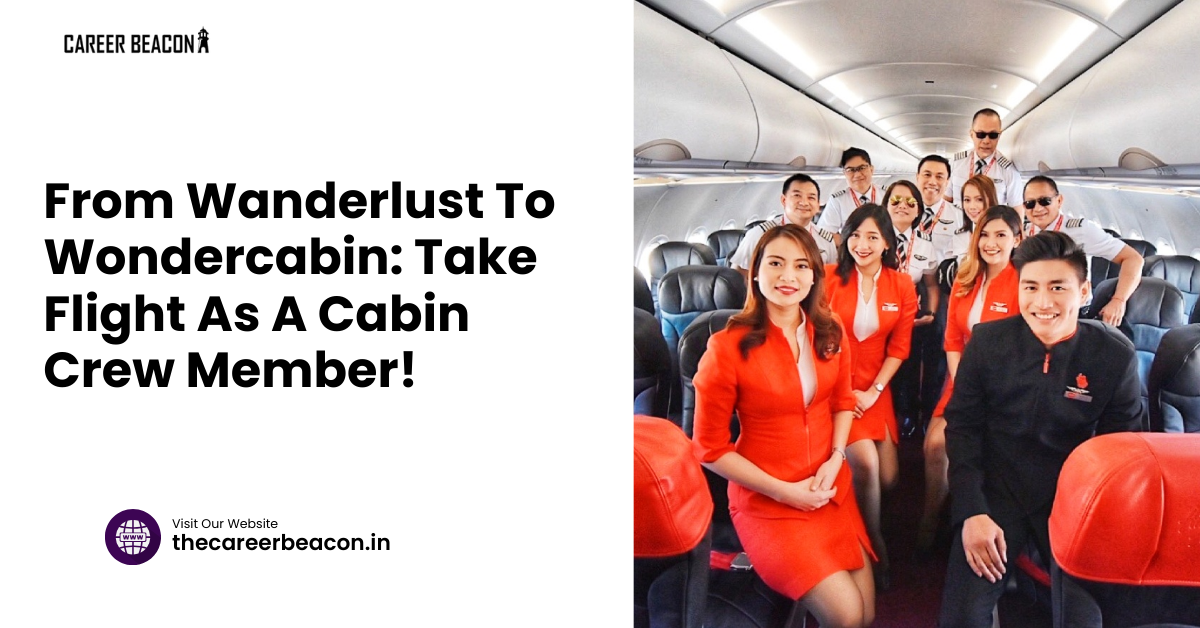
From Wanderlust to Wonder cabin: Take Flight as a Cabin Crew Member!
Have you ever gazed out of an airplane window, watching the world shrink beneath you, and thought, “That could be my office?” If the answer is yes, then a career as a cabin crew member, also known as a flight attendant, might be the perfect fit for your wanderlust and desire for adventure.
Beyond the glamorous image of jet setting around the world, being a cabin crew member is a demanding but rewarding profession. It requires a unique blend of skills, qualifications, and personal qualities. But fear not, aspiring globetrotter! This guide will equip you with all the knowledge you need to take flight in your dream career.
Unpacking the Cabin Crew Qualifications Checklist
While serving meals and beverages is certainly part of the job, there’s much more to being a cabin crew member. Airlines prioritize safety and exceptional customer service, and that’s reflected in their hiring criteria. Here’s a breakdown of the key qualifications to get you shortlisted:
Formal Training: Some airlines require cabin crew members to undergo professional qualification courses. These programs provide a strong foundation in various aspects, including:
- Safety and emergency procedures: You’ll learn how to handle everything from fire emergencies to medical situations onboard.
- Safety equipment and first aid: Being proficient in using emergency equipment and providing first aid is crucial for passenger safety.
- Galley management and food & beverage services: Mastering the art of in-flight service ensures a smooth and enjoyable experience for passengers.
- Product knowledge: You’ll gain in-depth knowledge about the airline’s services, amenities, and destinations.
- Passenger care and customer relations: Excellent communication and interpersonal skills are key to building rapport and ensuring passenger satisfaction.
- Grooming and professional appearance: Maintaining a polished and professional image is an important part of the job.
- Aircraft familiarization: Understanding the aircraft’s layout and systems is essential for efficient cabin operations.
- Customs and immigration regulations: Ensuring passengers comply with regulations at various destinations is part of the responsibility.
- Crew resource management: Working effectively as a team is vital for a well-coordinated cabin crew.
Minimum Requirements
To be eligible for these training courses, you’ll typically need to meet the following criteria:
- Be at least 18 years old (some airlines require 21)
- Have a high school diploma (or equivalent) with good grades in English
- Possess a valid passport with no travel restrictions
- Demonstrate a high level of physical fitness
- Have normal color vision
Skills Required
- Soft Skills that Make You Soar: Beyond the technical aspects, airlines seek individuals with these personal qualities:
- Excellent communication and interpersonal skills: You’ll be interacting with passengers from diverse backgrounds, so clear and confident communication is essential.
- Exceptional customer service skills: Providing a warm, welcoming, and attentive service is paramount to passenger satisfaction.
- Teamwork and collaboration: Cabin crew members work as a cohesive unit to ensure a smooth flight operation.
- Numeracy skills: Handling cash transactions and accounting for duty-free sales requires basic numeracy skills.
- Adaptability and flexibility: The job demands working irregular hours, long layovers, and adapting to various situations.
- Confidence and composure: The ability to remain calm and collected under pressure is crucial for handling emergencies.
- Problem-solving skills: Thinking on your feet and finding solutions to passenger concerns is a valuable asset.
Your Duties: Ensuring a Smooth and Safe Flight
So, what exactly does a cabin crew member do on a daily basis? Here’s a glimpse into their key responsibilities:
- Pre-flight Briefings: Attending briefings to understand flight details, passenger information (including those with special needs), and any safety updates.
- Pre-flight Checks: Ensuring the cabin is well-stocked with supplies, safety equipment is functional, and the overall environment is prepared for passengers.
- Passenger Welcome and Seating: Greeting passengers warmly, directing them to their seats, and assisting with baggage storage.
- Safety Demonstrations: Clearly demonstrating emergency procedures and safety equipment usage to ensure passenger understanding.
- In-flight Service: Providing meals and refreshments, attending to passenger needs, and ensuring their comfort throughout the flight.
- Duty-Free Sales: Offering duty-free products to passengers and explaining allowance restrictions.
- Passenger Communication: Making announcements, answering questions, and addressing passenger concerns.
- Emergency Preparedness: Being prepared to handle emergencies, follow safety protocols, and provide first aid if necessary.
- Post-flight Tasks: Ensuring a safe disembarkation, checking the cabin for leftover belongings or suspicious items, and completing flight reports documenting any noteworthy events.
The Skies Are Calling: Employment Outlook for Cabin Crew
The job market for cabin crew members is promising. Studies project a 17% growth in employment opportunities for flight attendants between 2019 and 2029. This surge is driven by the ever-increasing number of air passengers and a high turnover rate within the profession. Airlines are constantly seeking qualified individuals to fill these growing positions.
So, if you possess the necessary qualifications, a passion for travel, and a commitment to exceptional service, a career as a cabin crew member could be your perfect gateway to an exciting and fulfilling future. Now that you’re armed with this valuable information, take the next step and explore cabin crew training programs offered by reputable airlines. Remember, the sky’s the limit for those who dream of soaring above it all!
Bonus Tip: While this guide provides a general overview, research specific airlines you’re interested in to understand their unique requirements and application processes. Many airlines host open days or information sessions, so take advantage of these opportunities to gain firsthand insights into the profession.
Get ready to embark on a rewarding journey filled with adventure, new cultures, and the satisfaction of ensuring a comfortable and safe travel experience for your passengers. Buckle up and chase your dream of becoming a cabin crew member!


